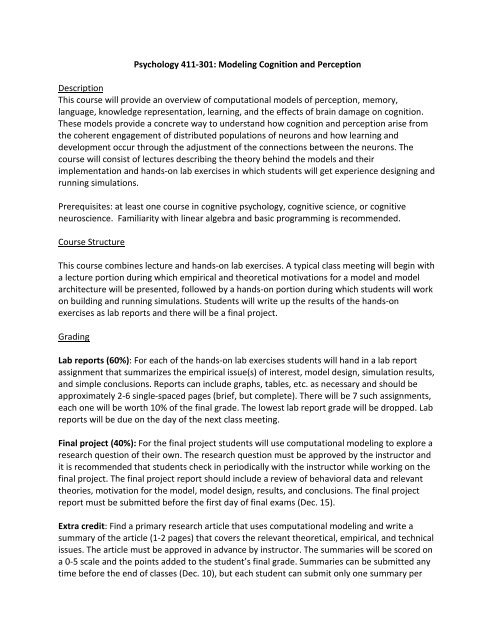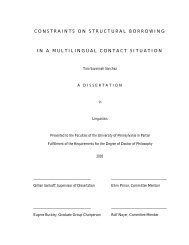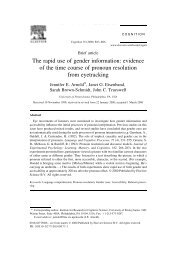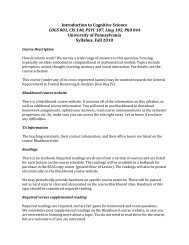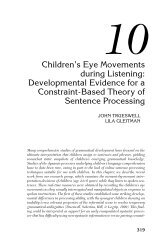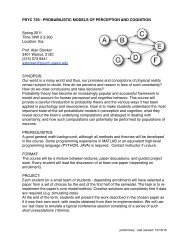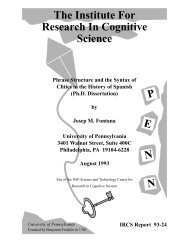Psychology 411-301: Modeling Cognition and Perception ...
Psychology 411-301: Modeling Cognition and Perception ...
Psychology 411-301: Modeling Cognition and Perception ...
You also want an ePaper? Increase the reach of your titles
YUMPU automatically turns print PDFs into web optimized ePapers that Google loves.
<strong>Psychology</strong> <strong>411</strong>-<strong>301</strong>: <strong>Modeling</strong> <strong>Cognition</strong> <strong>and</strong> <strong>Perception</strong><br />
Description<br />
This course will provide an overview of computational models of perception, memory,<br />
language, knowledge representation, learning, <strong>and</strong> the effects of brain damage on cognition.<br />
These models provide a concrete way to underst<strong>and</strong> how cognition <strong>and</strong> perception arise from<br />
the coherent engagement of distributed populations of neurons <strong>and</strong> how learning <strong>and</strong><br />
development occur through the adjustment of the connections between the neurons. The<br />
course will consist of lectures describing the theory behind the models <strong>and</strong> their<br />
implementation <strong>and</strong> h<strong>and</strong>s-on lab exercises in which students will get experience designing <strong>and</strong><br />
running simulations.<br />
Prerequisites: at least one course in cognitive psychology, cognitive science, or cognitive<br />
neuroscience. Familiarity with linear algebra <strong>and</strong> basic programming is recommended.<br />
Course Structure<br />
This course combines lecture <strong>and</strong> h<strong>and</strong>s-on lab exercises. A typical class meeting will begin with<br />
a lecture portion during which empirical <strong>and</strong> theoretical motivations for a model <strong>and</strong> model<br />
architecture will be presented, followed by a h<strong>and</strong>s-on portion during which students will work<br />
on building <strong>and</strong> running simulations. Students will write up the results of the h<strong>and</strong>s-on<br />
exercises as lab reports <strong>and</strong> there will be a final project.<br />
Grading<br />
Lab reports (60%): For each of the h<strong>and</strong>s-on lab exercises students will h<strong>and</strong> in a lab report<br />
assignment that summarizes the empirical issue(s) of interest, model design, simulation results,<br />
<strong>and</strong> simple conclusions. Reports can include graphs, tables, etc. as necessary <strong>and</strong> should be<br />
approximately 2-6 single-spaced pages (brief, but complete). There will be 7 such assignments,<br />
each one will be worth 10% of the final grade. The lowest lab report grade will be dropped. Lab<br />
reports will be due on the day of the next class meeting.<br />
Final project (40%): For the final project students will use computational modeling to explore a<br />
research question of their own. The research question must be approved by the instructor <strong>and</strong><br />
it is recommended that students check in periodically with the instructor while working on the<br />
final project. The final project report should include a review of behavioral data <strong>and</strong> relevant<br />
theories, motivation for the model, model design, results, <strong>and</strong> conclusions. The final project<br />
report must be submitted before the first day of final exams (Dec. 15).<br />
Extra credit: Find a primary research article that uses computational modeling <strong>and</strong> write a<br />
summary of the article (1-2 pages) that covers the relevant theoretical, empirical, <strong>and</strong> technical<br />
issues. The article must be approved in advance by instructor. The summaries will be scored on<br />
a 0-5 scale <strong>and</strong> the points added to the student’s final grade. Summaries can be submitted any<br />
time before the end of classes (Dec. 10), but each student can submit only one summary per
week. Tip: you’ll need to read <strong>and</strong> underst<strong>and</strong> articles for your final project anyway, so writing<br />
summary paper(s) for those articles would be an easy way to get bonus points.<br />
Readings<br />
The primary reading assignments will be articles describing behavioral experiments <strong>and</strong>/or<br />
computational models that will serve as the basis of h<strong>and</strong>s"on lab assignments. In addition<br />
there will be assignments from the online PDP H<strong>and</strong>book<br />
(http://www.stanford.edu/group/pdplab/pdph<strong>and</strong>book/).<br />
Software for simulations<br />
1. Matlab: write your own simulation code “from scratch” using Matlab.<br />
2. PDPtool (http://www.stanford.edu/group/pdplab/resources.html#pdptool): Matlab-based<br />
toolbox designed for just this sort of class. The Stanford PDP group provides support <strong>and</strong><br />
development for this tool, including user’s guide etc.<br />
3. Lens (http://www.stanford.edu/group/mbc/LENSManual/index.html): Powerful, st<strong>and</strong>alone<br />
simulation program. No longer under development, somewhat less support, but has a user’s<br />
guide.
Schedule<br />
Week Date Topic(s)<br />
2 Sept. 13 Course introduction<br />
PDP Basics:<br />
Neural inspiration<br />
The Perceptron<br />
Interactive Activation & Competition<br />
Technical<br />
Linear algebra<br />
Software<br />
3 Sept. 20 Visual search<br />
LAB<br />
4 Sept. 27 Memory:<br />
Content-Addressable Memory<br />
Graded Constraint Satisfaction<br />
LAB<br />
5 Oct. 4 Language production<br />
Computational cognitive neuropsychology<br />
LAB<br />
6 Oct. 11 No class – more time to finish language production lab report<br />
7 Oct. 18 Basic learning<br />
Delta rule<br />
Generalized delta rule: Back propagation<br />
XOR<br />
LAB<br />
8 Oct. 25 No class – more time to finish XOR lab report<br />
9 Nov. 1 Semantics<br />
LAB<br />
10 Nov. 8 Simple recurrent networks<br />
Grammar learning<br />
LAB<br />
11 Nov. 15 Word learning<br />
LAB
Week Date Topic(s)<br />
12 Nov. 22 Distributed vs. localist representations<br />
Emergent vs. stipulated structure<br />
13 Nov. 29 Unsupervised (Hebbian) learning<br />
Final project work/discussion time<br />
14 Dec. 6 Final project work/discussion time


